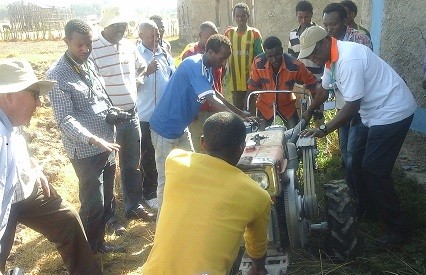Are two – wheeled tractors the trigger to smallholder farm mechanization?
Are two – wheeled tractors the trigger to smallholder farm mechanization?
Article written by JC Achora- Knowledge and Information Manager -the African Conservation Tillage Network
Introduction
The Farm Mechanism and Conservation Agriculture for sustainable intensification project held its second review and planning meeting, as well as the mid- term review during a five day fully packed event, at Hawassa, Ethiopia. This was followed by specific country site visits by the Review team. The meeting comprised of plenary sessions, group meetings and field visits.
The overall goal of FACASI is to improve farm power balance, reduce labour drudgery, and minimize biomass trade-offs in Eastern and Southern Africa, through accelerated delivery and adoption of Two Wheeled Tractor (2WT)-based technologies by smallholders. Through testing of the different 2WT technologies, meetings and field visits, various practices and experiences involving two wheeled tractors are explored for further learning.
During this meeting, Field visits were made to five sites consisting of a youth community project, a vocational youth training institution, government research centres and manufacturing plants. One of the objectives of field visits within the FACASI project is to learn and share experiences from ongoing practices of small scale agricultural machinery, specifically the two wheeled tractor in diverse environments. Participants observe and draw learning lessons from the various models, the services that support small farm mechanization, and the associated business models.
The field visits
The Youth Community project at Chico Wereda Sidama zone 60 kms
In an attempt to get youth involved in agriculture, farm mechanization is one of the strategies and attraction that will, perhaps trigger youth involvement in agriculture. With this in mind, a field visit was arranged to the Youth group at Chico consisting of 10 members. This group has been operational for one year and grows maize for both consumption and the market. A two wheeled tractor was given to the youth under a Public- private sector initiative and a loan scheme arrangement. The Youth were also given five hectares of land, a package of equipment to provide tractor hire services for themselves first, then hire out to other members of the community. Through this scheme, they were also linked to a microfinance company and given a revolving fund, that would be repaid after a period of three years. The loan amount was 30,000 birr. Although the group faces various challenges, it is expected these will be overcome through more training programs and mentorship.
Other sites visited
Other visits were made to the Hawassa Research station where a demonstration of seeders and the Multi-User Sheller and Thresher (MUST) were carried out; the Ato Tibebe Selemon Metal works where metal fabrication is done; and to the Selam Hawassa Business and Vocational college which provides disadvantaged youth with practical training in General Metal Fabrication and Assembly and Building Electrical Installation. Youth are identified from poor backgrounds and an in-take of 100 students per year is carried out. Training includes Fabrication, Hotel and catering, construction. This college also make hydropower turbines of all sizes. 75% of the training conducted is practical. Using this approach, the college finances the public sector by producing technologies. It runs a three year program.
The last visit was made to the Metals and Engineering Corporation (METEC) which specializes in the integration of engineering in the production of machines and installation of industrial facilities. METEC is one of the institutions established by the Federal Democratic Republic of Ethiopia (FDRE) to enable the realization of the government’s Growth and Transformation Plan (GTP) and to accelerate the ongoing transition of Ethiopia into industrialization. Currently, METEC is comprised of 15 semi-autonomous, and integrated manufacturing companies that are operating in more than nine different sectors.
What is the significance of this field experience to the FACASI project?
The experience of this youth group provided a lot of learning for the FACASI participants. FACASI is testing out various business models on farm Mechanisation using two–wheeled tractors. Although in some of the four countries where FACASI is operating, mechanization policies exist, the extent to which these policies are operational or implemented is questionable. Learning from the other visit sites and from some of the work FACASI has done, some of the business models, already identified and working on the ground include:
- Dealer led - Tractors and Equipment Companies;
- Importer and Dealer led;
- Manufacturer led; and
- Service Provider - led (Entrepreneur)
The new emerging business models include:
- Farmer led - Group of farmers (this is model being tested and supported by FACASI);
- Private Individual-led (Cash crop farmers, Agro-dealers/Entrepreneurs); and
- Contractor led- Contract farming
However, opportunities for use of two wheeled tractors do exist and these include decreasing farm sizes among small holder farmers; the multiple use of the two wheeled tractor; the existence of experienced dealers who already operate the four wheeled tractors; new projects coming up and igniting the demand for the two wheeled tractors could trigger the increase in imports and manufacture in Africa. Perhaps not too far in the future two wheeled tractors could be the stepping stone to smallholder farm mechanization in Africa.

